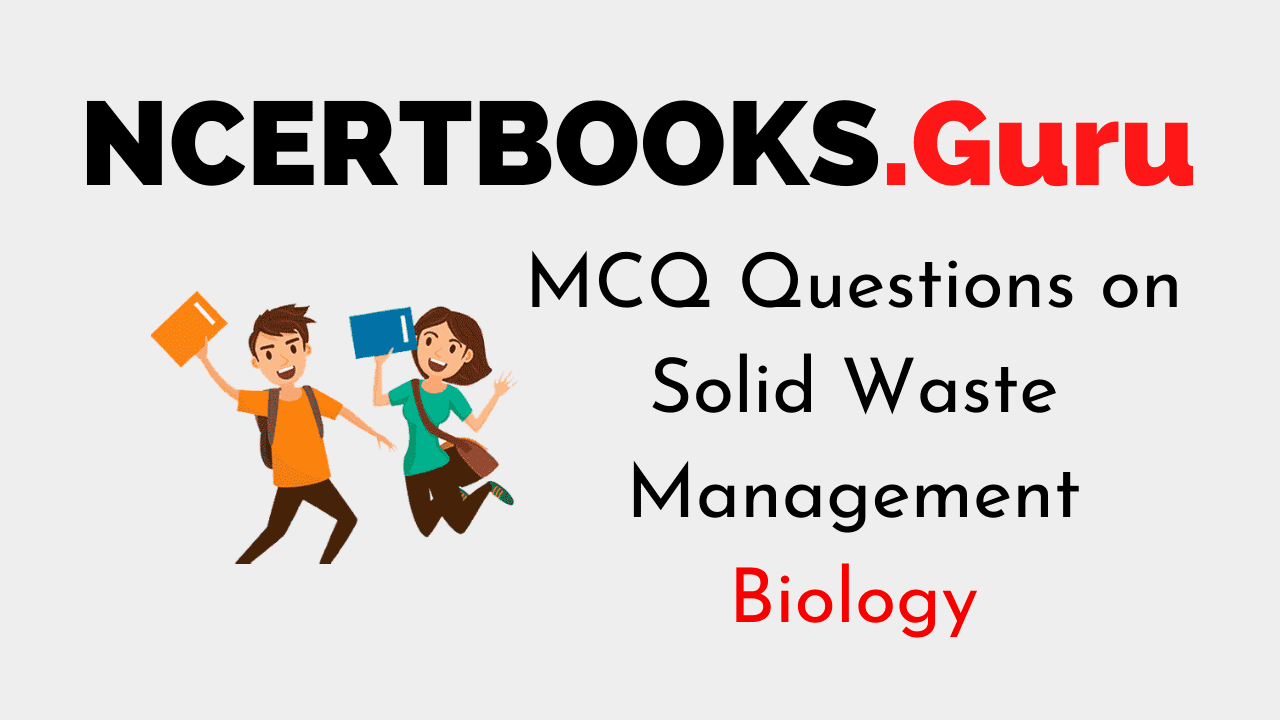Biology is the study of life. Below, You will find a list of Biology MCQ Questions as per the latest prescribed syllabus. Ace up your preparation with the Objective Questions available on Solid Waste Management and enhance your subject knowledge. Understand the concept clearly by consistently practicing the Multiple Choice Questions and score well in your exams.
MCQ Questions on Solid Waste Management
1. Which of the following cities was the first one to establish a system of waste removal?
(a) Athens
(b) Lahore
(c) Paris
(d) London
Answer
Answer: (a) Athens.
2. Which of the following solid wastes describe the term ‘Municipal Solid Waste’?
(a) Toxic
(b) Hazardous
(c) Non-toxic
(d) Non-hazardous
Answer
Answer: (d) Non-hazardous.
3. Why are plastics difficult to recycle?
(a) Because it is a very hard material
(b) Because of the different sizes of plastic
(c) Because it is very adhesive in its nature
(d) Because of different types of polymer resins
Answer
Answer: (d) Because of different types of polymer resins.
4. Which integrated waste management is reduced on an individual level?
(a) Burning
(b) Disposal
(c) Recycling
(d) Source reduction
Answer
Answer: (d) Source reduction.
5. Why is recycled paper banned for use in food containers?
(a) Because it creates a lot of spaces
(b) Because it creates contamination
(c) Because paper can be used only one time
(d) Because paper is very thick and can’t cover the food containers
Answer
Answer: (b) Because it creates contamination.
6. Which of the following plans are used as a waste management plan?
(a) Use a waste management plan
(b) The integrated waste management plan
(c) Recycling of waste management plan
(d) Reducing the waste management plan
Answer
Answer: (b) The integrated waste management plan.
7. Which of the statements is true for the organic material in the buried solid waste that will decompose?
(a) By the flow of water
(b) By the soil particles
(c) By the action of microorganisms
(d) By the action of oxidation
Answer
Answer: (c) By the action of microorganisms.
8. Which of the following wastes are called the Municipal Solid Waste (MSW)?
(a) Food wastes
(b) Wood pieces
(c) Plastic cans
(d) All of the above
Answer
Answer: (d) All of the above.
9. The process of burning municipal solid wastes in a properly designed furnace under suitable temperature and these operating conditions is called ______.
(a) Landfill
(b) Incineration
(c) Recycling
(d) Vermicomposting
Answer
Answer: (b) Incineration.
10. The burning of the wastes is not an acceptable practice of solid waste management because
(a) It is very costly
(b) It requires a lot of space
(c) It requires modern technologies
(d) It causes several environmental issues
Answer
Answer: (d) It causes several environmental issues.
11. Which of the following gas generates when the matter inside the sanitary landfill breaks down?
(a) Methane
(b) Nitrogen
(c) Hydrogen
(d) All of the above
Answer
Answer: (a) Methane.
12. Which of the following is the simplest and most common method used in the cities to dump the collected wastes?
(a) River
(b) Ocean
(c) Landfill
(d) None of the above
Answer
Answer: (c) Landfill.
13. The most disposable wastes are in the form of________________.
(a) Solids
(b) Liquids
(c) Slurries
(d) All of the above
Answer
Answer: (d) All of the above.
14. Which of the following is true about wastes?
(a) The apparent waste from one process becomes the input to another
(b) All processes of production and consumption produce waste
(c) There is no real waste in nature
(d) All of the above
Answer
Answer: (d) All of the above.
15. Which of the following methods is a good way of dealing with the solid waste problem?
(a) Recycling
(b) Landfilling
(c) Both a and b
(d) None of the above
Answer
Answer: (a) Recycling.
16. Which of the following statements is not true for plastic wastes?
(a) Can be used to make compost
(b) It lasts for a longer period of time
(c) Toxic fumes are produced when burnt
(d) All of the above
Answer
Answer: (a) Can be used to make compost.
17. Which of the following can be recycled many times?
(a) Wood
(b) Plastic
(c) Aluminium
(d) Organic materials
Answer
Answer: (c) Aluminum.
18. Which of the following gas can be produced from landfill wastes?
(a) Biogas
(b) Natural gas
(c) Liquified petroleum gas
(d) All of the above
Answer
Answer: (a) Biogas.
19. Which of the following statements are the features of zero waste management?
(a) Separate collection of each kind
(b) Separation of garbage at the source
(c) Involvement of the community in all activities
(d) All of the above
Answer
Answer: (d) All of the above.
20. How many main components are there in integrated waste management?
(a) Two
(b) Three
(c) Seven
(d) Eleven
Answer
Answer: (b) Three.
